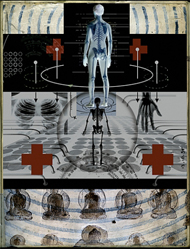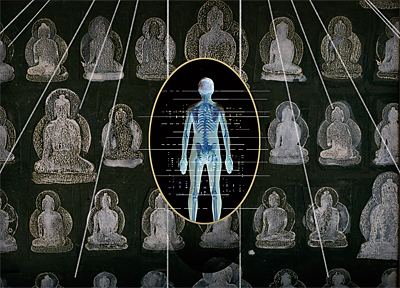
In our Summer 2010 issue, there is an interview with transhumanist, bioethicist, and former Buddhist monk James Hughes. In Cyborg Buddha, Hughes takes on the relationship between Buddhism and transhumanism. Like other transhumanists, he makes the claim that science and technology may eventually enhance the human mind and body so that existential inevitabilities such as suffering, sickness, and death may become a thing of the past, whether through cybernetic implants, physical alterations, genetic manipulation, or advanced pharmacology. Because Buddhism is rooted in core teachings about the inherent nature of suffering and the inevitability of sickness and death, the assertions of the transhumanist movement present an interesting question: could transhumanism make Buddhism obsolete?
A few months ago, as the scandal and media frenzy surrounding Tiger Woods led to much discussion of Woods’s relationship to Buddhism, comedian and social critic Bill Maher stated that Buddhism is already “outdated,” and that it is a “’Life sucks, and then you die’ philosophy that was useful when Buddha came up with it around 500 B.C., because back then life pretty much sucked, and then you died—but now we have medicine, and plenty of food and iPhones, and James Cameron movies—our life isn’t all about suffering anymore.” As you can expect, many people took issue with such an assertion, for it is, in fact, quite simplistic and ignorant (not to mention that the Buddha’s teachings do in fact extend beyond the first noble truth). Yesterday, an article was posted on the Institute for Ethics & Emerging Technology blog, in which Bill Maher’s statement was analyzed from a transhumanist perspective.
While it’s true that, especially in the first world, we have reached an advanced enough level of technological sophistication that human beings as a whole live longer and live lives less prone to disease, thus decreasing physical suffering, the phenomena itself of physical suffering has not been eliminated. We all still get old, get sick, and eventually die, and up to this point there has been no exception to this.
The piece continues,
Looking forward, specifically looking towards a transhumanist future, our technology and understanding of science will probably improve further from the point that they are at now. This will bring with it less disease, longer (possibly indefinite) life spans, and more advances in eliminating physical suffering. Thinking in the arena of smart drugs and the like, we will have further control over our mental states. Eventually, we may reach a point where humans (or our descendants, whatever form they may take) are immortal, hyperintelligent, and don’t suffer from mental illness. But I don’t know if we will ever be able to overcome the mental suffering we all experience.
Read the complete article here.
Personally, I think it is quite naive to think that technology, while undoubtedly having the ability to drastically change many aspects of our existence, could ever change the fundamental nature of our existence. Thousands of years ago, when agrarian civilization first developed, there were probably people who thought farming and commerce were the answer to humanity’s ills, and the same is probably true of the the discovery of electricity, the industrial revolution, and the information age. Yet did any of these advancements actually conquer human suffering? Of course not. Upon examination of our evolution and history as a species it is safe to say that suffering has evolved with us, adapted to us, and is still just as much an inherent part of our existence as it was in the time of Shakyamuni Buddha. Nevertheless, I could be wrong, and as a Buddhist, I am probably biased. I view the four noble truths as just that, truths. I don’t call them the ‘four noble hypotheses.’ If a day comes where technology allows us to live forever, thus rendering the Buddha’s teachings on birth, old age, sickness, and death obsolete, congratulations to us. If, as Steven Hawking recently advocated, we colonize space to ensure our survival, and eventually settle on countless planets throughout countless solar systems and galaxies, ensuring an infinite intergalactic existence and disproving the truth of impermanence, congratulations to us. But I have my doubts.

Thank you for subscribing to Tricycle! As a nonprofit, we depend on readers like you to keep Buddhist teachings and practices widely available.